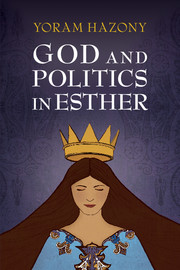Book contents
- Frontmatter
- Dedication
- Contents
- Preface
- Introduction
- Esther One
- Esther Two
- Esther Three
- 3 The Enemy
- 4 The King's Men
- 5 Idolatry
- 6 Disobedience
- 7 Joseph
- 8 Amalek
- 9 Anti-Semitism
- Esther Four
- Esther Five
- Esther Six
- Esther Seven
- Esther Eight
- Esther Nine
- Afterwords
- Notes
- Index of Names
- Scriptural and Rabbinic References
- The Hebrew Esther Text
- Miscellaneous Endmatter
5 - Idolatry
from Esther Three
Published online by Cambridge University Press: 05 March 2016
- Frontmatter
- Dedication
- Contents
- Preface
- Introduction
- Esther One
- Esther Two
- Esther Three
- 3 The Enemy
- 4 The King's Men
- 5 Idolatry
- 6 Disobedience
- 7 Joseph
- 8 Amalek
- 9 Anti-Semitism
- Esther Four
- Esther Five
- Esther Six
- Esther Seven
- Esther Eight
- Esther Nine
- Afterwords
- Notes
- Index of Names
- Scriptural and Rabbinic References
- The Hebrew Esther Text
- Miscellaneous Endmatter
Summary
Yet there is something more to Mordechai's refusal to prostrate himself than these political considerations alone. After all, the refusal to bow is traditionally a Jewish expression of religious faith: Jews do not refuse to bow before kings or their viziers. Jews refuse to bow before idols. Are we then to understand that Mordechai believed the vizier somehow to be an idol, that he had made of himself a god?
When the rabbis retold the story of Mordechai's refusal, they understood that such was indeed the case, writing, for example, that the new vizier had affixed an idol to his tunic: “Was Mordechai just looking for quarrels, or just being generally disobedient to the king's commands? The fact is that when Ahashverosh ordered that all should bow down to Haman, the latter affixed an idolatrous image on his breast for the purpose of making all bow down to the idol.” The Talmud also cites the opinion of R. Huna, who was even more direct: “What had Mordechai seen that he picked a quarrel with Haman? It was for this reason, that he had made himself an object of worship.” The argument is that Mordechai's assault on the installation of the new vizier is not only a reaction to a current political event. In taking up this political cause, Mordechai the Jew joins into in a far broader Jewish war, already in progress a thousand years and more; and Haman, while certainly the purveyor of an immediate political evil, is also the latest champion of that same philosophical and religious horror that Judaism had come into existence to fight in the time of Abraham. If we are to fully appreciate the Jews’ war against the vizier, a war that opens with a man who will not bend, and closes with the deaths of a substantial part of the fighting power of Persia, we must understand the idolatry against which the war was fought.
Judaism and idolatry are irreconcilable opponents, for Judaism is the rejection of the servitude to idols and false gods. Thus R. Johanan argued: “Anyone who repudiates idolatry is called a Jew.” And historically, at least, this was the case: Judaism arose from within the blast furnace of Mesopotamian and Egyptian idol worship in the time of Abraham as a reaction against what was then considered civilization. But R. Johanan was not only referring to the distant past.
- Type
- Chapter
- Information
- God and Politics in Esther , pp. 40 - 45Publisher: Cambridge University PressPrint publication year: 2015



